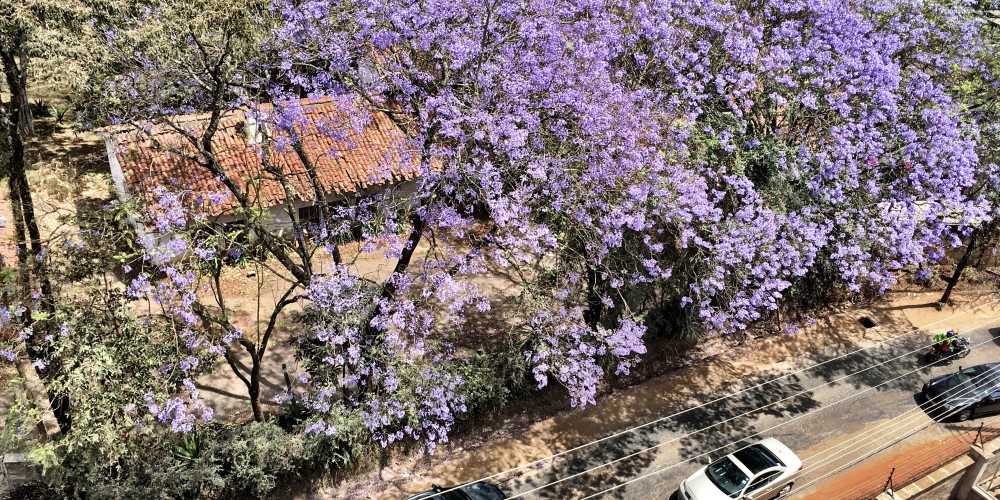Nature is our mother, and we must honour her

Nairobi in October is a sight to behold. It is as though a giant hand descends from the heavens wielding an artist’s brush, and paints vast swathes of the city a beautifully subtle shade of purple.
I am referring, of course, to the fact that we have so many Jacaranda trees in our city. They flower once a year, creating lovely lilac umbrellas and carpets wherever they are. Where many Jacarandas have been planted together a beautiful mosaic captivates the eye and cheers the soul.
The beauty makes us all feel better about our city – a city that can often otherwise be ugly, dirty and brutal. Kenyans on Twitter celebrated the Jacaranda phenomenon using the hashtag #JacarandaPropaganda. Hundreds of crowdsourced photos of the city, resplendent in purple, were shared. It was a moment in time when people collectively felt happy about their shared habitat.
But with the joy always comes a shadow that casts a chill: how long will this beauty last? Will we protect these trees, or will we bring them down in the name of development? We should not have such a shadow over us; we should feel safe that shared beauty is our joint heritage, and that we have the sense and institutions to protect it. Yet the shadow is always there.
This isn’t just about a particular type of tree. It is about the role of nature in our lives. Traversing this planet over the years, I came to one conclusion a very long time ago: there is nothing that human beings will ever create that will come remotely close to matching the sheer majesty of mother nature.
Gaze upon Mount Kenya’s snow-streaked, jagged peak revealing itself from behind its wispy veils. Look at the sun rising beyond the Indian Ocean and setting the water ablaze. Observe the astounding colour changes Lake Victoria undergoes every day in the throes of sunset. No human work of art can give you a similar sense of peace and elation.
Listen to the daily orchestra that takes up its instruments every morning just before dawn: the birds who create complex symphonies for our delectation. Look at the sunlight dappling through the leaves and creating lovely patterns on the grass. These phenomena can give peace to even the most troubled soul. When we connect with nature, we connect with our essence. We feel what it means to be alive. All else is just toil and duty.
We are given such wondrous gifts by nature, every single day. Why do we not cherish them and protect them? For some, it is the desperation of poverty; for others, their greedy and petty natures. We look at trees and we see dollars instead of beauty. We gaze upon forests and start calculating the return per acre if a mall was put up there in its stead. In a bubbling river we see not a vibrant ecosystem, but a place to dump our refuse.
When we do this unchecked, we all lose. We lose not just beauty and serenity, but our futures. Nature bites back. When floods hit a denuded city, we know what happens next. When droughts become the norm in once-lush habitats, livelihoods are hit hard. When oceans are filled with waste, tourists have nothing to come for. When pollution grows unrestrained, disease and death follow.
Why do we permit this? Partly because we have swallowed the lie that laying waste to nature is development – that human beings need housing and jobs more than they need tranquil vistas. Actually they need both. There is no dichotomy. We can have balance. We can grow our economies without destroying our environments. We can have material gain without stripping mother earth of her adornments. Singapore, one of the world’s richest societies, contains more than two million trees in an area scarcely bigger than greater Mombasa.
But to strike that balance we need to be led by those with the wisdom to see beyond the next corrupt tender, and the institutions that protect nature without fear or favour. We need a citizenry that has been schooled in the interconnectedness of life. We don’t have those things, and therefore we will lose much before we come to understand.
Trees and elephants and rivers and oceans and lakes are not ours to exploit. They are the gifts of divinity. They are what give meaning to human life. No monetary gain will help you when you look upon a barren ruin. Nature is our mother, and we must honour and protect her and let no one besmirch her beauty.
(Sunday Nation, 23 October 2016)

Buy Sunny Bindra's new book
The X in CX
here »
Popular Posts
- The pause that saves usJune 8, 2025
- Where are you rushing to—your funeral?June 29, 2025
- How to spot a real thinkerJune 15, 2025
- Built the app, forgot the flowJune 22, 2025
- The first push is the hardestJune 1, 2025















